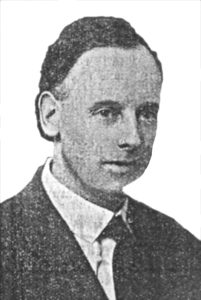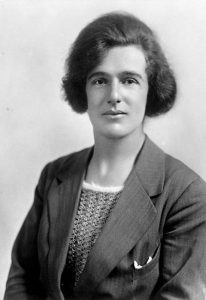Thomas Helliker – trade union martyr from Trowbridge
An apprentice shearman, Thomas Helliker took part in a successful strike in Trowbridge at the start of the Nineteenth century. Unions were banned which forced workers into clandestine activities. During the strike a mill was burned down and Helliker was arrested for arson. The evidence against him was thin but the witness who placed hime elsewhere at the time disappeared. Helliker may well have known who was responsible but he refused to say and was hanged the day before his nineteenth birthday.
John Prior – Plymouth joiner leader
Devon-born John Prior became an apprentice carpenter and joiner in Plymouth. He led the local Joiners’ Society and demands for better conditions led to a lock-out. His handling of the dispute enhanced his reputation and he was elected to the General Council of the Amalgamated Society of Carpenters and Joiners. He became General Secretary 1871 to 1881 after which he became HM Inspector of Workshops and Factories.
 Samuel Plimsoll – champion for sailors from Bristol
Samuel Plimsoll – champion for sailors from Bristol
Born in Bristol in 1824, Samuel Plimsoll is remembered by unions for his services to those who work on the sea. As an MP his first speech helped legalise trade unions and he raised awareness of the hazards of methane gas in mines. His memory live on in the name of the line that all ships must paint on their hulls to prevent overloading. Before the ‘Plimsoll Line’ greedy owners would often overload ships to boost their profits. But such ships were liable to capsize in rough seas. Sailors sometimes took matters into their own hands and refused to board such ships even if this meant imprisonment. Plimsoll fought long for ship safety and the Merchant Shipping Act of 1876 made load lines compulsory. The basic symbol, of a circle with a horizontal line passing through its centre, is now recognised worldwide. When a ship is loaded, the water level must not go above the ‘Plimsoll Line’ with variants displayed to take into account temperature, saltiness, season and location.
Robert Gray Tovey – Bristol’s first Labour councillor
In 1886 the Bristol and District Labour League took on the City’s Mayor, Charles Wathen in the St. Paul’s ward. Robert Gray Tovey of the Clothiers Cutters’ Association and Secretary of Bristol Trades Council was selected at a public meeting. The League advocated municipalisation of water, lighting and tramway undertakings and the abolition of unnecessary sub-lettings of Corporation contracts. Despite a dirty campaign during which Robert Tovey was called an atheist and a drunkard, he lost by just eighteen votes in a shock result: 584 to 566.
The following year, Robert Tovey was successful, becoming the first Labour Councillor in Bristol.
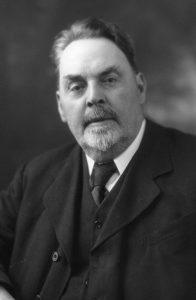
by Bassano, whole-plate glass negative, 27 October 1922
James Wignall – organiser and first South West Labour MP
The first Labour MP in the South West was James Wignall, a trade union organiser for copper sheet rollers. He beat the Sir Henry Webb, Liberal in the Forest of Dean in 1918 and won again in 1922, 1923 and 1924. He died after collapsing in a corridor in the House of Commons in 1925.
Fred Gould – boot and shoe organiser to MP for Frome
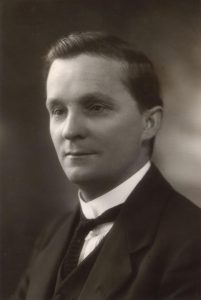
Fred Gould, was elected for Frome, Somerset in 1923 and again in 1929. He had been one of the group that met in Radstock in 1907 to form a branch of the Independent Labour Party. The constituency included Keynsham and south east Bristol along with the mining areas of Radstock and north Somerset.
In 1931 some 17 per cent of workers in the area were employed in the mines but it was also a stronghold for the National Union of Boot and Shoe Operatives of which Fred Gould was the secretary of their Midsomer Norton branch. He had organised the union in the area and led a key strike in 1906 when the owner of Butlers factory sacked the union steward. Membership rose from 40 to 170 during the dispute and the firm agreed to the union’s terms.
Gould had boundless energy and held Sunday afternoon Brotherhood meetings in the free churches around the area. There were a number of disputes around what Gould asked: “Are we going to control the machine or is the machine going to control us?” He was elected a Labour councillor in 1910.
As MP he became parliamentary private secretary to a minister at the Board of Trade. Having lost the seat in 1931 his union moved him to fight Leicester East where there were more footwear workers although he was unsuccessful.
 Ben Tillett – Bristol-born dockers’ leader
Ben Tillett – Bristol-born dockers’ leader
Ben Tillett was born into poverty at 8 John Street, Bristol in the shadow of the Easton Coal Pit. He moved to London and after marrying Jane Tompkins, settled down in Bethnal Green and had nine children. He joined the Tea Operatives and General Labourers’ Association and in 1887 was elected as General Secretary. In 1889 Tillett’s union was involved in the London Dock Strike. The dockers demanded four hours continuous work at a time and a minimum rate of sixpence an hour. During the strike Tillett lost his speech impediment and became one of the labour movement’s greatest orators. After five weeks the employers granted all the dockers’ main demands.
After the successful strike, the dockers formed the General Labourers’ Union. Tillett was elected General Secretary and Tom Mann became the union’s first President. In London some 20,000 men joined this new union. Tillett and Mann wrote a pamphlet together called New Unionism, where they outlined their socialist views and explained how their ideal was a “co-operative commonwealth”. In September 1910 Tillett helped to establish the National Transport Workers’ Federation, an organisation of 250,000 workers. He became the leader of the union and in 1911 it won a national strike.
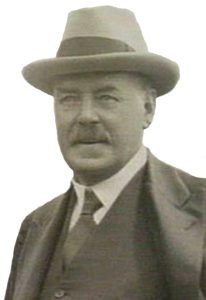
Tillet helped found the trade union newspaper, the Daily Herald. After a term as MP, Tillett retired from the House of Commons in 1931 and died in 1943.
Jim O’Grady – Bristol-born union leader
Bristol-born James O’Grady (1866-1934) became President of the TUC. He was MP for Leeds East from 1906 to 1924. He took a keen interest in international affairs and negotiated an exchange of prisoners with the Soviet Union in 1919 and was involved in union-led efforts to relieve the Russian famine in 1921. On leaving Parliament he was made Governor of Tasmania until 1930 and then Governor of the Falkland Islands until his retirement in 1934.
George Odger – Devon-born TUC leader
George Odger (1820-1877) was the son of a Cornish miner born at Rouborough in Devon and became a shoemaker. He was one of the ‘junta’ that led unions before the TUC was formed. He represented London Trades Council at the first TUC Congress in 1869 and became one of its first secretaries.He stood in Bristol in the 1870 by-election for the Labour Representation League, set up the year before to promote working class MPs. He wore the silk hat made for him by the Hatters’ Trade Union during the campaign in Bristol. Odger came a close second, winning 4,382 votes to the Tory’s 4,686.
The hat is now in the People’s History Museum in Manchester.
John Allen – Bristol boiler-maker’s leader
On 27th July 1836 the Loyal Sons of the Globe held its first meeting in the Old Globe, Christmas Street, Bristol. This was the start of the Bristol branch of the boilermakers’ union. John Allen became Secretary and later became General Secretary.
Beatrice and Sidney Webb – Fabian founders and union advocates
Bournemouth was one of the first towns to have a Fabian Society and the most famous early members – Beatrice and Sidney Webb – became associated with the south coast resort.
Beatrice was born in Standish House near Gloucester. The grand-daughter of radical MP Richard Potter, she attended school in Bournemouth and in 1886 her father settled in a house near the Royal Bath Hotel. She was in Bournemouth when her letter on unemployment was printed in the Pall Mall Gazette and seen by Joseph Chamberlain, a leading Liberal. She had an infatuation with the ageing widower and it stirred her political writings. During her work on co-operative history, Beatrice met Sidney Webb. In 1890 she noted in her diary: “At last I am a socialist.” Sidney had come to Bournemouth to recover from scarlet fever and in 1891 they were married. The couple wrote a book on the history of trade unions that is still used as a key publication for scholars.
Sidney Webb wrote Clause IV of the new Labour Party constitution calling for collective ownership of the means of production, distribution and exchange. In 1910 Beatrice spoke in Bournemouth on her Minority Report on the Poor Law Commission. Organised by the Poole and Bournemouth branch of the National Committee for the Prevention of Destitution, the meeting heard the Fabian case for public spending to relieve poverty. Beatrice appealed to those living comfortable lives in the town to help.
Robert Knight – Devon-born boiler-maker’s leader
Born in 1833 in Lifton in Devon, Robert Knight became an angle ironsmith during the construction of Brunnel’s Royal Albert Railway Bridge across the Tamar. He got a job in the dockyard at Devonport in 1857 where he became involved with the Boiler Makers and Iron and Steel Builders’ Society. He was elected to chair the ‘Wages Movement Committee’ and in 1870 was elected General Secretary of the union. Knight’s term of office came at a time of an improvement in trade. He represented the union on the Labour Representation League and the TUC. He was a supporter of the cooperative movement and active in the Ancient Order of Foresters. The Boiler Makers eventually joined the General and Municipal Workers in 1982 to form what is now the GMB.
 Henry ‘Harry’ Slatter – Gloucestershire-born printer’s leader
Henry ‘Harry’ Slatter – Gloucestershire-born printer’s leader
Harry Slatter was born in Cheltenham in 1830. He was a print worker and was elected one of the earliest General Secretaries of the Provincial Typographical Association 1869-1897. He was an ardent cooperator and was President of the Cooperative Printing Society. He sat on the TUC Parliamentary Committee – now the General Council – from 1877 to 1890 and became its Treasurer. Craft unions like the TA were reticent about involvement in wider politics and he resigned from the TUC after the success of socialist ‘new unionists’ in 1890. He is described in the history of the TA as the first working man appointed a magistrate in 1885 in Manchester.
George Howell – Somerset-born TUC leader
George Howell was born at Wrington in Somerset in 1833 and went to school in Bristol. Aged twelve he started work 12 hours a day as a mortar boy and then as a bricklayer. He didn’t like the building work and became an apprentice shoemaker where he met Chartist activists. He got invovled in the campaign and when he moved to London became involved in trade unionism. He was Secretary of the London Trades Council, the Reform League and the TUC Parliamentary Committee 1872-5.
Albert Mansbridge – Gloucester-born founder of the WEA
Every year thousands of adults take up learning with the Workers Education Association. They run courses from learning about the internet to local history. The Association is more than 100-years-old and was formed by Albert Mansbridge (1876-1952) who was born near the India House in Barton Street, Gloucester. His father was a carpenter and his mother an active member of the Women’s Co-operative Guild.
Albert wanted “workers to have their share of the kingdom of the mind,” according to biographer Mary Stocks. He was working as a clerk for the Co-op when he sought to win trade union support for his mission to bring education to working people. Albert became a teacher and in 1903 established the Association for Promotion of Higher Education for Working Men, later to be re-named the WEA. He wrote a book called An Adventure in Working Class Education in which he said: “Every living person is potentially a student.” Albert helped found the South West Co-operative Housing Association and was chair between 1944-48 when it set out to provide homes after the war. A road on the Society’s estate in Totnes, Devon is named after him.
He died in Torquay in 1952 and is buried in Gloucester Cathedral.
 Emma Paterson – Bristol union leader, first woman on TUC General Council
Emma Paterson – Bristol union leader, first woman on TUC General Council
Emma Paterson (1848-1886) was born in London. In 1867 she became assistant secretary of the Working Men’s Club and Institute Union, gaining trade union experience. In 1872 she became Secretary of the National Society for Women’s Suffrage. Paterson founded the first women’s trade union: the Women’s Protective and Provident Association in 1874 and in 1875 in Bristol formed the National Union of Working Women. The union represented a wide range of workers including dressmakers, upholsterers, bookbinders, artificial-flower makers, feather dressers, tobacco, jam and pickle workers, shop assistants and typists. In 1875 she was the first ever woman delegate to the Trade Union Congress held in Glasgow as a representative of the bookbinders’ and upholstresses’ societies. She went on to become the first woman member of the TUC General Council.
Enid Stacey – Bristol socialist and union activist
Enid Stacey was born in 1868. She became active in trade unionism during the upsurge of radical ideas in the 1870s in Bristol. She helped women sweet workers fight poor pay and conditions and raised money and support during their strike.
Ruby Part – Somerset organiser of glovers
The West Country has long had a leather industry producing a range of products including gloves and shoes. Unions have a history of organising the workers – men and women. In 1916 Ruby Part was an organiser for the Workers’ Union in Somerset. She successfully opened a chain of new branches for women glove-makers even in isolated rural areas.
The National Union of Glovers and Leather Workers was formed in 1920 and primarily based around Yeovil. It was not until 1931 that it opened its ranks to women and then only on restricted terms. Women who joined risked the reaction of the employers. Twelve women at Ensors in Chard joined the union and were threatened with the sack. The union stood by the new recruits and the boss backed down. By 1938 there were three women on the Union’s Executive and equal memership terms were agreed. It took a lot longer to get equal pay. The various unions came together in the National Union of Footwear, Leather and Allied Trades which then became part of the Community Union.
Julia Varley – helped lead Cornwall’s 1913 china clay strike
Born in Bradford in 1871, Julia Varley was influenced by her Chartist grand-father and the memory of the Peterloo Massacre. She started work at the age of twelve in the local mill and so got involved in the union. She was involved in the unsuccessful strike at Manningham Mills in 1890 and she played wider roles in the growing ideas of a Labour Party and women’s rights. She was arrested and imprisoned for joining a suffragette protest at the House of Commons. Varley moved to Birmgnham as secretary of the City’s Women Worker’s Organisation Committee, which aimed to assist women workers, especially in Cadbury’s Bourneville factory. She threw herself into helping the 1910 women chainmakers strike in the Black Country and became an organiser for the rapidly growing Workers’ Union. When the strike of china clay workers broke out the union called on Varley to help marshall support amongst the families and communities around east Cornwall. After her Cornwall experience she helped the Blists Mill strikers in the Cotswolds and her talents led her to being elected to the TUC General Council. She worked closely with Margaret Bondfield and the pair became the leading women in the trade union movement.
<!– hidden broken link Julia Varley – trade union organiser and fighter for women’s rights – Unite Education publication –>
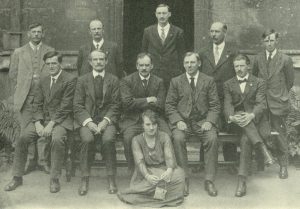
Shirey Bliss – blacklisted printers’ leader from Gloucester
Edmund Shirey Bliss was the Gloucester Secretary of the Typographical Association in 1923 during the dispute over the first national agreement for printers. The action was solid but the Industrial Court backed the employers and the resolve was lost.
Keen to see the union broken, Gloucester newspaper and jobbing printers, Chance and Bland, sacked Bliss. They declared that they had nothing against his work. The Typographical Association members went on strike in support but after a month were forced back to work.
Blacklisted by local employers, Bliss established a co-operative called Gloucester Printers in Hopewell Street. The union, local Labour Party, Trades Council and co-op took out shares in the venture that proved a success and survived to the 1960s. The presses were made available to volunteers so they could produce the daily Gloucester Strike Bulletin during the General Strike in 1926.
Leaders of the Forest of Dean miners
David Organ (1876-1954) was President of the Forest of Dean Miners’ Association. He helped lead the poorly-paid mine workers through the strike in 1920, the lock-out in 1921 and the General Strike in 1926. Dave Jenkins championed the miners’ cause and faced two weeks’ hard labour rather than pay a twenty shilling fine during the General Strike. Forest miner Frank Hodges became Secretary of the Miners’ Federation of Great Britain and Chief Negotiator with Lloyd George.
Sir Charles Dilke – champion for shop workers and miners, Forest of Dean MP
The radical Liberal MP for Chelsea, Charles Dilke, was being tipped as the next prime minster when a sex scandal forced him to resign. Out of office, the Forest of Dean miners persuaded him to become their MP. He champions the cause of miners and shop workers. Each year he called together the trade unionleaders to discuss the coming Parliamentary programme.
Alf Purcell – TUC General Council member, Forest of Dean MP
Alf Purcell (1872-1935) was a key personality in the British and international labour movement in the 1920s. He came from the militant Furnishing Trades Union and became a long-term member of the TUC General Council. Purcell held syndicalist views and helped form the British Communist Party. As President of the International Federation of Trade Unions he gained an international reputation as a champion of the Soviet revolution. Purcell joined Labour Party and was briefly elected as MP for the Forest of Dean 1922-24. He became chairman of the General Strike committee in 1926, a role that lost him significant credibility on the Left. He was elected MP for Coventry but never found his position within the movement again. He returned to his home town of Manchester and died in 1935.
Emily Phipps – headteacher, feminist, barrister and teachers’ leader
Emily Frost Phipps the oldest of five children, was born on 7 November 1865 in Devonport, Plymouth. She became a teacher in an elementary school but progressed to head teacher in Cambridge and then transformed a poorly performing school into one of the most successful in Wales.
A committed feminist, she, together with fellow West Country woman and lifelong friend Clara Neal, joined the Women’s Freedom League in 1908. The meeting had been attended by Lloyd George who claimed that women were being paid to disrupt the meeting, and that they should be forcibly removed. Emily Phipps and Clara Neal were so disgusted they became militant suffragettes.
They supported the boycott of the 1911 Census, staying overnight in a sea cave on the Gower Peninsula. At the NUWT dinner called to celebrate full female suffrage she explained the reason for the action:
“Many women had determined that since they could not be citizens for the purposes of voting, they would not be citizens for the purpose of helping the government to compile statistics: they would not be included in the Census Returns.”
Emily Phipps was an active member of the National Union of Women Teachers (NUWT), which was formed as part of the National Union of Teachers (NUT) in 1906, following on from the Equal Pay League. Emily was elected President from 1915 to 1917 and was the first editor of the NUWT journal, Woman Teacher, from 1919 to 1930, which she ensured was forthright and political. She wrote the History of the NUWT published in 1928. She stood for Parliament as an Independent Progressive candidate for the Chelsea constituency in the 1918 General Election but was heavily defeated.
While still a headteacher, Emily Phipps studied for the bar and was admitted as a barrister in 1925. She gave up teaching and moved to London acting as council to the NUWT. Clara Neal moved to London with her until they retired to Eastbourne. Phipps died on 3rd May 1943.
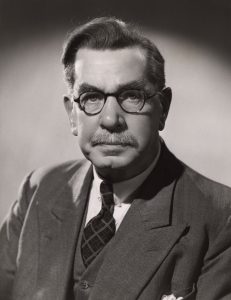
by Bassano,photograph,1945
Walter Ayles – engineering union, Bristol MP and concientious objector
Born in London in 1879, Walter Ayles was one of five children of railway porter Percy Walter Ayles and his wife Elizabeth. Aged thirteen he worked in a cardboard-box factory and then apprenticed at London and South-Western Railway engineering works. After a lockout in 1897 he went to Birmingham and became district secretary of the Amalgamated Society of Engineers. In 1904 he joined the Independent Labour Party and was elected to the Birmingham Board of Guardians, Aston. In 1910 Ayles moved to Bristol as ILP branch full-time Secretary. In 1912 he was elected to Bristol City Council for Easton, a seat he held until 1922.
His 1913 pamphlet Bristol’s Next Step and 1923 ILP booklet What a Socialist Town Council would do helped spread his name. He was elected to ILP National Council 1912-1927 and chaired Bristol Labour Party for nine years. A Methodist and Congregationalist preacher for twenty years, he later joined the Society of Friends (Quakers) and was an active teetotaller. An effective speaker in the West of England, Ayles’ election meetings at Bristol North were described as occasions of almost religious fervour. He was a firm pacifist and conscientious objector when the war broke out. He became Secretary of the No More War Movement. He was imprisoned for refusing national service and as a consequence could not stand for Parliament in 1918.
Walter Ayles Photo: National Portrait Gallery
Ayles wrote several books and pamphlets including Militarism unmasked, Burn your gunboats: the case for complete disarmament, The hell of unemployment: the only way out and Why I worked for peace during the Great War: complete and uncompromising reply. He was elected MP for Bristol North 1923-1924 and 1929-1931. He lost in 1935 and he moved to win Southall in 1945. He was elected Labour MP for Hayes and Harlington in 1950. He died in 1953.
Ernest Bevin – Exmoor born, Bristol campaigner, ‘father’ of the TGWU, Minister of Labour and Foreign Secretary
Ernest Bevin, one of the most influential trade unionists of the twentieth century, was born into a large, poor family in Winsford in Somerset. He became a farm labourer but after a heated row with the farmer, he headed to Bristol where he did odd jobs before becoming a carter – delivering mineral water and pop. Ernest became involved in local politics, joining the Bristol Socialist Society. After he led a silent demonstration of unemployed men in Bristol Cathedral, the City Council agreed to a series of public works including the construction of the lake in Eastville Park – known for many years as ‘Bevin’s Lake’.
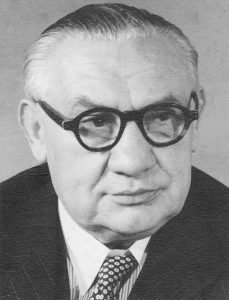
In 1910 a strike at Avonmouth spread to Bristol and Bevin supported them by forming a carters’ union branch. In 1911 he became a full-time officer and went on to win national acclaim when he presented the case for a pay rise to a court of enquiry. With no legal training and little time to prepare he forcefully and imaginatively put the arguments to the court, closely watched by the media. He used plates of food to show how poor the offer was. News photos of the derisory quantities of food shocked the nation and helped him to win a national minimum wage for dockers of 16s a day for a 44-hour week. The press dubbed him the ‘Dockers’ KC’.
Bevin was a tough, formidable organiser and he worked his way through the union to become General Secretary of the Transport and General Workers’ Union. He led the union during the General Strike in 1926, the depression of the 30s and the start of the war. In 1940, the day after Winston Churchill became Prime Minister at the head of the National Government, Bevin was asked to become Minister of Labour. He agreed and a month later he was elected unopposed as MP for Wandsworth. He mobilised millions of people to the war effort and re-directed conscripts to work down the mines. Those chosen became known as ‘Bevin Boys’. In 1945, with the war over, Labour won a landslide victory and Bevin became Foreign Secretary. He led Britain’s negotiations with the Soviet Union and America. It was the start of the Cold War and a period of recognition that Britain was no longer the powerful force it once was in the world. Bevin’s sudden death in 1951 ended a remarkable career from Somerset farm worker to the top of world politics.
Margaret Bondfield – Chard-born shop workers’ leader and first female cabinet member
Margaret Bondfield (1873-1953) was the first woman cabinet minister in Britain. Born in Chard, Somerset, the eleventh child of Anne Taylor and William Bondfield, she was a textile worker with left-wing views. She began an apprenticeship at the age of fourteen in a draper’s shop in Brighton and soon got involved in the union.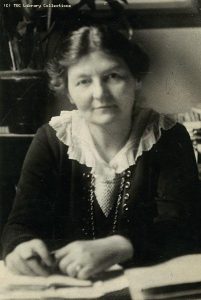
In 1896 the Women’s Industrial Council commissioned her to investigate the pay and conditions of shop workers. In 1898 she was elected assistant secretary of the Shop Assistants’ Union and in 1908 became secretary of the Women’s Labour League. She was President of the TUC General Council in 1923. In 1923 Margaret Bondfield was elected Labour MP for Northampton but lost her seat a year later. She won again in 1926, in a by-election in Wallsend. Three years later, Bondfield was appointed Minister of Labour by Ramsay MacDonald,the first woman to be a Cabinet Minister. She supported changes to unemployment benefit to eight shillings a week, earning her the nickname ‘eight-bob Maggie’.
After she lost her seat in the 1931 general election she became chair of the Women’s Group on Public Welfare. She also wrote a number of books including: Socialism for Shop Assistants (1909), Why Labour Fights (1941) and A Life’s Work (1949).
 Charles William Bowerman – Devon-born compositors’ leader, first TUC General Secretary
Charles William Bowerman – Devon-born compositors’ leader, first TUC General Secretary
Charles William Bowerman (1851-1947) was born in Honiton, Devon. He moved to London where he became a compositor and member of the London Society of Compositors in 1873. He became its General Secretary 1892-1906. Bowerman joined the Fabian Society and, in 1897, he was elected to the Parliamentary Committee of the Trades Union Congress. In 1901, he was elected as a Progressive Party alderman on London County Council. Bowerman was the President of the TUC in 1901 and Secretary of the Parliamentary Committee from 1911 until 1921, when he became the TUC’s first General Secretary. He retired in 1923. In 1906, Bowerman was elected Labour MP for Deptford, a post he held until 1931.
Arthur James Cook – Miners’ Leader from Somerset
Arthur James Cook (1885-1931) was the son of a soldier born in the Somerset village of Wookey in 1885. In the early 1900s Cook left to be a miner in South Wales. By 1919 he was miners’ agent (a union official) in the Rhondda. Cook was a brilliant, erratic and emotional speaker. In 1924 he was elected General Secretary of the Miners’ Federation at the age of 39. He led the miners up to and during the General Strikeplayed a key role in the 1926 miners’ strike and became the best-known miners’ leader. He died in 1931 aged just 47.
 Jimmy Thomas – made his name in Swindon, leader of the railway workers
Jimmy Thomas – made his name in Swindon, leader of the railway workers
Born in Newport in 1874 James Thomas became a railway fireman in a local colliery. Jimmy joined the Associated Society of Railway Servants Union and moved to Swindon where he became a popular figure amongst the local workforce and was elected the first Labour councillor for the town.
He became an officer of the union, helped lead the rail strike of 1911, form the National Union of Railwaymen and was elected General Secretary in 1917. Thomas led the national strike of 1919. The government backed down after one of the most successful strikes organised by the rail unions.
After the 1924 General Election Thomas became Secretary of State for the Colonies. He had little faith in the 1926 General Strike and the mine workers’ union accused him of betrayal for failing to show them enough support. The charge of treachery grew when he joined Ramsey MacDonald’s National Government that imposed cuts in unemployment pay. The Labour Party expelled him. Jimmy Thomas was forced to resign in 1936 when his son was accused of leaking Budget secrets to a man who had paid Thomas £15,000. He claimed the cash was an advance for a proposed autobiography but the story seemed implausible and his political career was over.
Throughout his turbulent career he enjoyed the loyalty of the Swindon rail workers and when he died in 1948 his body was brought back to the town for his funeral at Radnor Street. Workers lined the streets of Swindon to honour him. His son Leslie Thomas became the Conservative MP for Canterbury.
Herbert Bullock – Bristol-born GMB officer and TUC President
Herbert Bullock (1885-1967) was a trace horse driver for the glue factory in Bedminster. He lived at 3 Hedwick Avenue, St George, Bristol. He became active in the National Union of General and Municipal Workers (now GMB) and in 1926 became an officer for the union working out of an office in Kingsley Hall in Bristol.
In 1935 Bullock was a National Industrial Officer. He was elected onto the TUC General Council in 1937 and demonstrated his interest in adult education and youth welfare. In 1950 he became President of the TUC just before he retired.
 Ken Gill – Wiltshire-born, left-wing leader of TASS
Ken Gill – Wiltshire-born, left-wing leader of TASS
Ken Gill (1927- 2009) from Wiltshire became a leading figure in the turbulent industrial relations of the 1970s. He was General Secretary of the Technical, Administrative and Supervisory Section (TASS), from 1974 to 1988, when it merged with ASTMS to form the Manufacturing, Science and Finance Union.
Ken Gill was born in Melksham, and gained radical political views through poverty in his childhood. During the war his family took in a communist cobbler as a lodger who convinced the young Gill of the cause of socialism. He became the local Labour Party agent for Chippenham.
In 1949, at the end of his apprenticeship as a draughtsman, he moved to London. As a young communist at the height of the Cold War, he travelled to East Germany for the 1951 World Youth Festival and was arrested on his way there by the US military police. In 1962 he was elected a regional officer for the Draughtsmen and Allied Technicians’ Association. His new Liverpool base and willingness to lead workers in a series of battles helped get him elected as Deputy General Secretary and then to the top of TASS.
Ken Gill became a high profile trade union figure. He was on the TUC General Council for eighteen years and formed a left-wing group that pushed for radical policies in the face of economic down-turns and political crisis. He led union opposition to Barbara Castle’s Industrial Relations’ Bill, In Place of Strife and to wage restraint under Labour and Tory governments. Ken Gill became the first communist TUC President in 1974. He campaigned on equality and international issues, especially anti-apartheid and solidarity with Cuba.
Clifford Comer – Somerset-born health workers’ leader
Born at Weston-Super-Mare, Clifford Comer became a mental nurse at Wells hospital in 1918. He became branch secretary of the National Asylum Workers Union and Mental Health and Institutional Workers Union. He was elected to Somerset County Council for Labour. In 1932 Comer was appointed the union’s first national organiser and in 1938 he moved to London. He became Assistant General Secretary of the Confederation of Health Service Employees (COHSE) in 1947 and a year later was elected General Secretary. He retired unexpectedly in 1953. He died in 1978, aged 83 in Weston-Super-Mare.
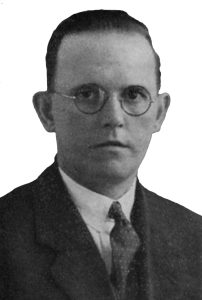
Claude Bartlett – Devon health workers’ leader, TUC President
Claude Bartlett joined the Asylum Workers Union in 1919 and was President of the Ivybridge Branch in Devon for 35 years. He became President of COHSE in 1946 joined the TUC General Council two years later. In 1959 he was elected President of the TUC.
EJ Searle – President of NALGO 1939-1943
EJ Serle was a County Surveyor with Somerset Council when he was elected President of the National Association of Local Government Officers.
CJ Newman OBE – President of NALGO 1939-1943
CJ Newman was the Town Clerk of Exeter.
Bill Miller – Plymouth trade unionist and first black councillor
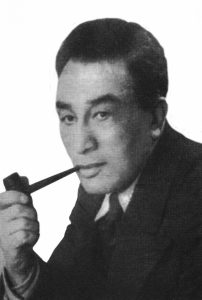
Bill Miller (1890-1970) was born in East Stonehouse, Plymouth. His grandfather had been a slave in Sierra Leone. He got a job in the electrical department in the dockyard and during the First World War he served in the Flying Corps. On his return to Plymouth, Miller got active in the Electrical Trade Union and the local Labour Party. He became President of the Devon and Cornwall branch of the union and in 1926 Miller was elected the first black councillor in Plymouth. He quickly made his mark. He brought an electricity showroom to the city and was credited with the building of the Tinside Lido – called by some at the time, ‘Miller’s Lido’.
In 1929 Jimmy Moses, was elected as the city’s first Labour MP with Miller as his agent. Moses also worked in the docks and was a leading figure in the shipwrights union. His election success was challenged in the courts over expenses. As agent, Miller had to face the bribery allegations. He was successfully defended by Sir Stafford Cripps. During the Second World War, Miller worked through the devastating blitz of the city. He took it on himself to commandeer transport to evacuate women and children from East Stonehouse. The authorities, however, were not amused and he was arrested for taking the law into his own hands. He was reprimanded but local people appreciated his actions.
After the war, the focus in Plymouth was the need for a massive rebuilding programme. As chair of the Housing Committee, Miller helped lead the ‘Plan for Plymouth’ and by 1952 he had overseen the building of 6,832 houses. He was so determined to see the work through he turned down the offer to be Lord Mayor. He retired from the council in 1970 and died later that year.
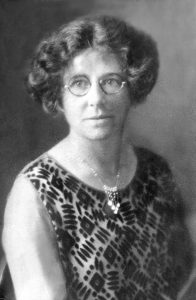
Red Kate Spurrell – Plymouth teaching unionist
Kate Spurrell was a teacher in Plymouth and in the 1920s was accused of preaching communism. She was active in support of the General Strike, speaking at rallies and raising funds. She stood for Labour in Totnes in 1929 and in 1935 for the Independent Labour Party in Camborne. She was friendly with Jimmy Maxton the radical leader of the ILP. Spurrell and Lady Nancy Astor were fierce political opponents in Plymouth and always mutually critical in public. Spurrell asked Lady Astor, then Mayoress, for help in evacuating children. Help was given generously and a lasting friendship formed. In 1942 she officially opened the nursery centre at Dartington Hall.
Kate Spurell photo: Planet News/Science and Society Picture Library
Jessie Stephen – Bristol Trades Council President
Jessie Stephen (1893-1979) grew up in Scotland and became a socialist. In 1912 she organised maidservants in Glasgow into the union and became active in the suffragette cause. A member of the Women’s Social and Political Union, she was assigned to pour acid into pillar boxes. In 1944 she moved to Bristol as Area Organiser for the Clerical and Administrative Workers’ Union. In 1952 she was elected President of the Bristol Trades Council and to the City Council. Jessie was awarded an MBE in 1977 and died in 1979.
Angela Tuckett – from Bristol to Swindon, activist and peace campaigner
Angela Tuckett was born in 1906 in Clifton, Bristol to prosperous Quaker parents. Her father ran the family law firm. The family had a radical background with Angela’s aunt, Enid Stacy, a well-known socialist.
In 1923 Angela became the first female law student to attend Bristol University. Using the family firm, she gained her articles and became a solicitor in a professional environment, run almost completely by men. She joined the Communist Party in 1929 as the economy was crashing and unemployment rising. She supported the hunger marches that often led to clashes with the police such as the one in Bristol in 1932.
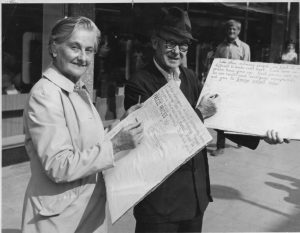
Angela was a keen hockey player and in 1931 was selected to play for England. When playing in Berlin in 1935 she refused to give the Nazi salute and possibly as a consequence was dropped from the team and never played for her country again. She became more politically active and supported the fight against Franco’s fascists in Spain. She loved music and arts and helped form Bristol Unity Players that put on theatre through the war. She moved to London to become Head of the Legal Department at the National Council for Civil Liberties (now Liberty) before joining The Daily Worker as legal adviser, reporter and sub-editor.
After the war she moved to Swindon and married Ike Gradwell in 1962. The couple helped build a strong Communist Party presence in the town. Angela wrote books, songs and poems. In her retirement, Angela was a feature of Swindon street stalls, marches and campaigns on peace, trade union disputes as well as folk music events. She died in 1994 and in 2015 Rosie MacGregor researched her life story and wrote a book Angela Remembered.
Pamela Enderby – Bristol speech therapist and champion for equal pay
Dr Pamela Mary Enderby was a speech therapist employed by the Frenchay Health Authority in North Bristol. In 1986, with the help of her trade union, Manufacturing, Science and Finance (MSF – now part of Unite), she began a legal claim for equal pay for work of equal value. Speech therapists were predominantly women and at that time she was paid £10,106, well below other comparable, mostly male, professionals such as a principal pharmacist who got £12,527 and a Grade III principal pharmacist who was paid £14,106. This launched the most lengthy and comprehensive equal pay claim ever. The case involved twenty-six court appearances (including the European Court of Justice), 2,000 applicants and sixteen test cases.
The case proved a success for women workers but was a powerful example of the long and drawn out process which can be involved in Equal Pay cases. The case started in 1986 and it took just over ten years to bring it to its final conclusion. The resulting compensation cost the government some £30 million. The Enderby case led the Labour government to institute a review of pay and grading scales throughout the health service in the form of the ‘Agenda for Change’. This was a massive job evaluation programme for everyone who worked in the Service to ensure equal pay.
Richard Hart – Jamaican union leader and independance leader, settled in Bristol
Richard Hart was a radical young lawyer when Jamaica was rocked by a wave of strikes. New unions were formed and Hart was involved including in the formation of the Peoples National Party. A keen historian he uncovered hidden stories of slave rebellions that helped inspire local people to take control of the island for themselves. Imprisoned during the war, Hart was part of the leadership that brought indepence to Jamaica but after a political fall-out he came to the UK as a local government solicitor. The newly elected left-wing government of Grenada persauded Hart to be the country’s attorney general. When Ronald Reagan sent in a US invasion force, Richard and his wife were lucky to escape. He came back to Britain where he setled inBristol.
Hart wrote and spoke about his country and slave rebellions.
Tony Benn – Bristol MP and trade union champion
Mike Grindley – chair of the sacked GCHQ workers
Mike Grindley was a linguist in Chinese Mandarain at the government’s communications centre in Cheltenham in 1984 when Mrs Thacther banned trade union membership. Like many otehrs Mike refused to give up his union but as the bribes and threats put pressure on workers he was one of fourteen sacked for refusing to give up his membership. He chaired the long campaign that led the new Labour Government lift the ban.
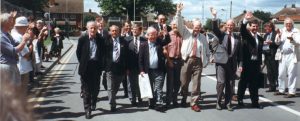
John Bees – Bristol docker’s leader and leading Labour councillor
John Bees was the South West Regional President of the Transport and General Workers Trade Union (Unite). He was a lifelong Labour Party member and served the City of Bristol as a councillor spanning many years, holding high Council Office.
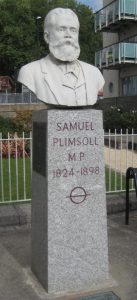 Samuel Plimsoll – champion for sailors from Bristol
Samuel Plimsoll – champion for sailors from Bristol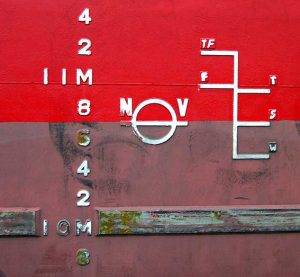
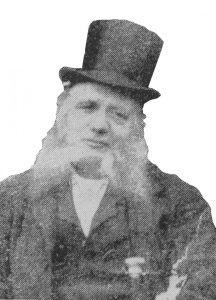
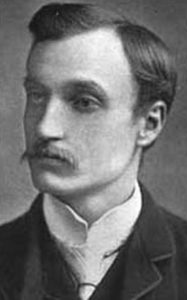 Ben Tillett – Bristol-born dockers’ leader
Ben Tillett – Bristol-born dockers’ leader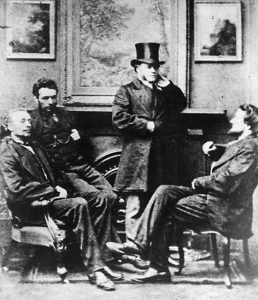
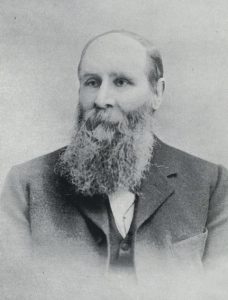
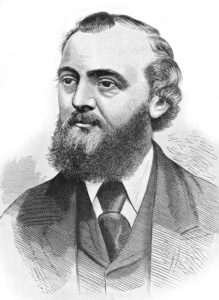 Henry ‘Harry’ Slatter – Gloucestershire-born printer’s leader
Henry ‘Harry’ Slatter – Gloucestershire-born printer’s leader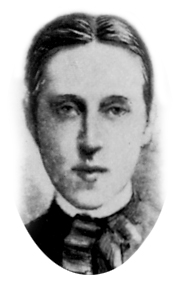 Emma Paterson – Bristol union leader, first woman on TUC General Council
Emma Paterson – Bristol union leader, first woman on TUC General Council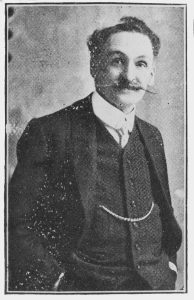
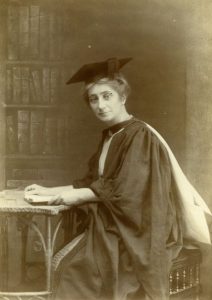
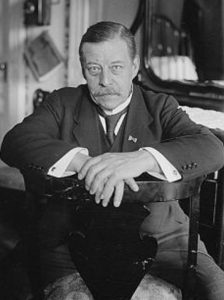 Charles William Bowerman – Devon-born compositors’ leader, first TUC General Secretary
Charles William Bowerman – Devon-born compositors’ leader, first TUC General Secretary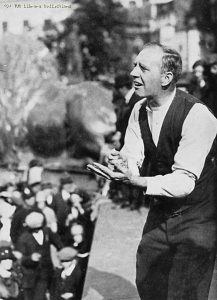
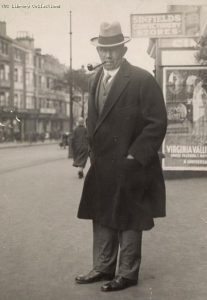 Jimmy Thomas – made his name in Swindon, leader of the railway workers
Jimmy Thomas – made his name in Swindon, leader of the railway workers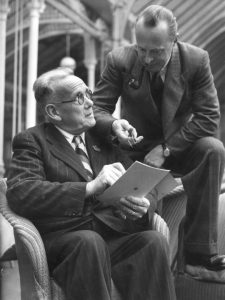
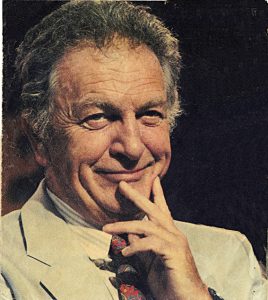 Ken Gill – Wiltshire-born, left-wing leader of TASS
Ken Gill – Wiltshire-born, left-wing leader of TASS